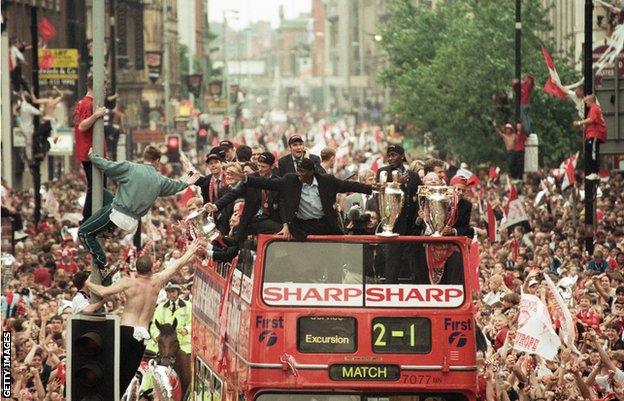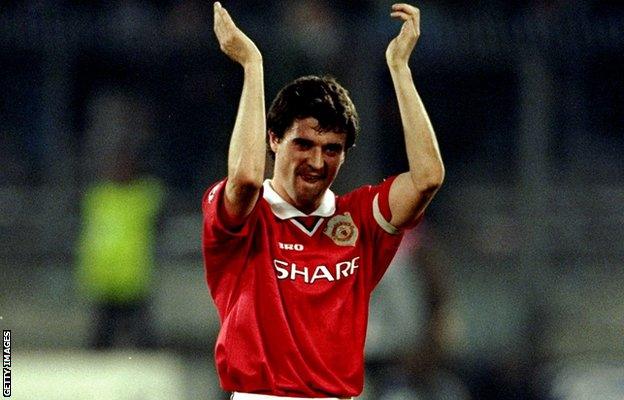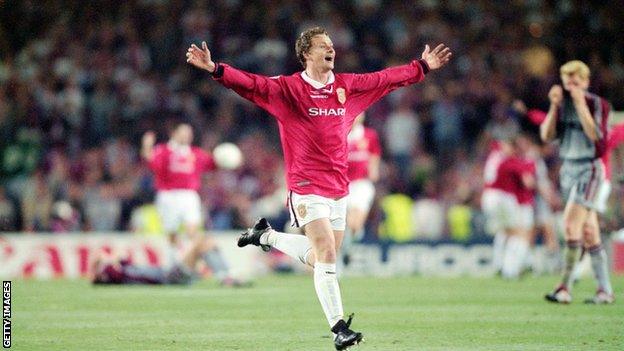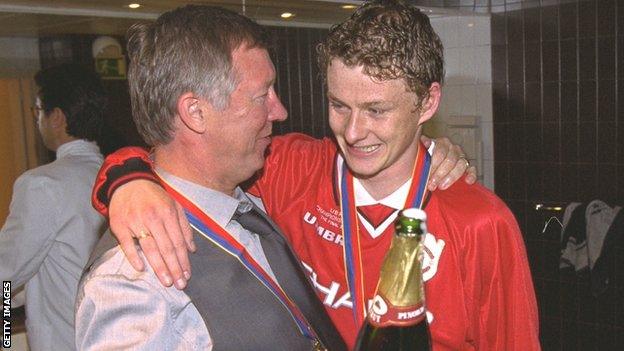Man Utd 1999 Treble: Near misses, determination & 'pure luck'
- Published
- comments


Thousands lined the streets of Manchester to celebrate on the team's return from Barcelona
On 26 May, it will be 20 years since Manchester United completed a remarkable Treble - becoming the only team to win the Premier League, FA Cup and Champions League in one season.
The club are marking the achievement by hosting a Champions League final rematch against Bayern Munich at Old Trafford, and will also be paying tribute on next season's kit.
Yet, such are the fine margins between success and failure that United's Treble hopes were almost killed off before the players seriously started to think it was possible.
Six weeks before finally completing their hat-trick of titles - Premier League, FA Cup and European Cup - Sir Alex Ferguson's side were playing major rivals Arsenal in an FA Cup semi-final replay at Villa Park.
Reduced to 10 men following the dismissal of captain Roy Keane, they were locked at 1-1 when Arsenal were awarded a penalty in the second minute of injury time.
Dennis Bergkamp prepared to take it. Up to that point in his Gunners career, the Dutchman had taken six penalties - and scored every one.
"When it was given, I honestly thought there were still about 10 minutes left," says United keeper Peter Schmeichel. "That's how the game had been. Two teams battling it out, just equal, nothing between them. In the end, at the highest, highest level, it is one stroke of luck that separates you."
Facing that penalty, Schmeichel had nothing to help him but his instincts and his agility. Contrast that with Ben Foster's situation 10 years later when United beat Tottenham on penalties to win the League Cup. On that Wembley day in 2009, United keeper Foster was shown footage on an iPod of where Spurs' players liked to put their spot-kicks.
Back in 1999 at Villa Park, Schmeichel was on his own. He went low to his left. The guess was correct.
"I had done no research," admits the Dane. "The save was pure luck. I'm glad we didn't have iPods in those days. Who knows what would have happened if there had been?"
Schmeichel's save was quickly upstaged as Ryan Giggs scored what has been voted the greatest FA Cup goal of all time to send United through. Physically, the players were exhausted. Mentally, Giggs felt a ripple going through the team. Others noticed it too.
Ryan Giggs v Arsenal: Is this the greatest FA Cup moment ever?
"Within the club, that match was the turning point," says Dave Fevre, the United physio in 1999.
"Two months before, Dwight Yorke was saying '25 more wins to the Treble'. It was a laugh really. But the hurdle of getting over Arsenal with 10 men was a big one. We came in afterwards and felt 'this could happen now'. That is when the belief really kicked in."
After that 14 April extra-time win, United still had 10 games to play if they were going to make history. They could not afford to lose a single one, but went behind in four. Of those, they came back to win three, drawing the other, at Leeds.
Before that Leeds game came a trip to Turin for a Champions League semi-final second leg that has gone down as the finest game of Keane's career.
So consumed was the Irishman in the battle to overturn Juventus' early two-goal lead, the full consequences of his yellow card for a poor tackle on Zinedine Zidane did not entirely hit home until long after the final whistle.
Keane would miss the final, but there were no Paul Gascoigne-style tears, just a steely determination to complete the comeback. He began it himself, scoring with a near-post header. Further goals from Yorke and Andy Cole sent United through 4-3 on aggregate. Next would be Bayern in Barcelona,
"I saw Roy in a different light to a lot of people because we had worked so closely together the previous year when he did his cruciate," says Fevre.
"He was a brilliant injured player. He had such inner strength. Anything I told him to do, he did. Tears are not his style. He knew he'd done his best to get the team there."

Roy Keane's performance in Turin was crucial to United's recovery in the match
It seems hard to believe now given Barcelona's entourage extended to 160 for their Champions League semi-final second-leg at Anfield on 7 May but two decades ago, Ferguson's backroom team was tiny.
Fevre explains: "It was me, Rob Swire, who was reserve-team physio but did the first team whenever we needed him, Mike Stone was the doctor and Jimmy Curran was a part-time masseur who also drove the bus. We didn't have a strength and conditioning coach. We didn't have a fitness coach.
"I always wanted the medical department to be the centre of the club, almost like a social club, where the lads could come in and get the banter. That is how it was at United in '99 - and the person who kept everyone bouncing was Dwight Yorke.
"You had fabulous characters and you certainly couldn't leave anything lying around when Paul Scholes was about because it would go missing - Brian Kidd used to call him the Artful Dodger - but Yorkie was the light-hearted one.
"He would come into the medical room every day but never for treatment. He would just ask for two paracetamol and then start laughing and joking. Everyone picked up on it."
United's first trophy that season was secured on 16 May. The Premier League title came courtesy of a final-day 2-1 comeback win over Tottenham at Old Trafford, as Arsenal finished a point behind, but more drama arrived the following night.
Keane, out with his team-mates to celebrate their success, got involved in an altercation in a central Manchester bar and ended up spending a night in the police cells.
Ferguson got him out the following morning. Given he was banned for the Champions League final and was injured in the early stages of the FA Cup final, United's Treble did not turn out to be Keane's greatest few days.

United finished one point ahead of Arsenal to win the 1998-99 Premier League title
For Fevre, the FA Cup final against Newcastle at Wembley on 22 May involved a tricky conversation with defender Jaap Stam.
The Dutchman had been nursing a hamstring injury, but wanted to play. Fevre had seen the scans and said no.
"He was disappointed but it was too big a risk," he says. "I had to explain the physiology and the dangers. If there was a little tear and he extended it, he wouldn't just miss the Champions League final, he wouldn't be fit for the start of next season either. It was actually a fairly straightforward decision."
Stam did come on for the final 12 minutes, although by that time a one-sided game had already been won thanks to goals from Teddy Sheringham and Scholes.
This time the celebrations were muted. Ferguson noted all the players likely to be involved at the Nou Camp four days later were in bed by 01:30.
Instead of returning north, United relocated to Bisham Abbey National Sports Centre in Berkshire, where they were joined by a nutritionist and a chef. Analysis of Bayern Munich consisted of one 40-minute video, condensing the highlights of the two drawn group games against the Germans earlier in the competition.
They flew to Barcelona on Concorde the following day.
"None of us had been on it before, so it was quite exciting," says Fevre. "I was sat next to [reserve-team manager] Jimmy Ryan, who has a very dry sense of humour. One of the attendants asked if they could get him anything. He said: 'Do you have any fast food?' The girl just didn't understand Jimmy's sense of humour. 'No sir, but we have some sandwiches.' We were in stitches."
Training at the stadium the night before a Champions League match was not a new experience. Using the home dressing room was.
"All the lockers had a Barcelona player's personal picture on them," says Fevre. "The lads were scrambling about who was having whose locker. We went back to the hotel and played Trivial Pursuit that night. The staff had a couple of drinks and went to bed."
The final itself did not go to plan. Mario Basler gave Bayern the lead after six minutes. United struggled to find any fluency. As the massive stadium clock ticked towards 90 minutes, Fevre noticed something.
"The trophy was brought to the side of the pitch with the Bayern colours on. Even Uefa had decided the outcome."
What happened next was almost beyond comprehension, certainly to Bayern defender Samuel Kuffour, who ended up lying face down on the pitch, banging the ground in frustration.
A David Beckham corner. A misdirected Ryan Giggs shot. Teddy Sheringham turned in a 91st-minute equaliser.
Two minutes later, another Beckham corner swings in. Sheringham flicked on at the near post. Ole Gunnar Solskjaer jabbed home the winner.
Pandemonium.

Solskjaer's 93rd-minute winner left the Bayern players shell-shocked
Schmeichel: "My brain just overloaded. I know the celebration. I know the goals. But only because I have seen them on TV. From the night itself, I have no memory."
Solskjaer: "I remember the celebration when I slid and then all these bodies piling on top of me. I remember thinking the subs were all there and wondering how they got there so quickly.
"I also remember accepting an interview request immediately after the game. I lost two or three minutes of the celebrations because of that. I could hear it but I wasn't there. If I had my time again, I would say no to the interview."
Fevre: "My one regret was celebrating the equaliser in front of the Bayern bench but we had it rubbed in our faces that we weren't going to win. Normally I am dead calm and collected. I don't get too flustered by goals. But for the second, I just lost it.
"I threw a medical bag in the air and all the stuff came out. I ran on to the pitch. We all did. It was crazy.
"The celebrations on the pitch went on for ages. we got back to the dressing room and threw [kit manager] Albert [Morgan] into the bath. The party started at 03:30. Nobody went to bed. We just went straight for the plane."

Sir Alex Ferguson was knighted in the Queen's Birthday Honours less than a month after the final
Such were the crowds for the parade through Manchester the following day that it took three hours to get down Deansgate, a main road through the centre of the city that measures just over a mile.
For United, it marked the end of an epic six weeks. For Fevre it marked the end of his time at United. Two days later, he handed Ferguson his letter of resignation after accepting an offer to join Blackburn, closer to his family home.
He still has the memories though; everyone associated with United's Treble success does.
"There was a fantastic spirit in that squad," recalls Solskjaer, now the United manager himself.
"It came from the top. The manager instilled this hunger and humility, a desire to work hard and win. We never accepted defeat. In training, we kicked each other in order to win. In quizzes with the gaffer, we had to win.
"It was about work-rate. It was about coming in on time. It was about doing all the extras that can give you those little percentages that win you games.
"They are the things that are easy to do, but also very easy not to do. Do we go all in, or don't we?"
For six weeks in 1999, Manchester United went every single step.